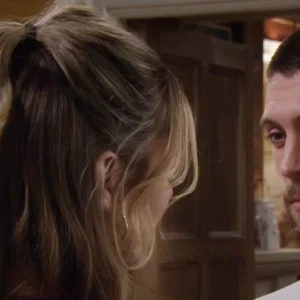In a heart-wrenching development that has reverberated throughout the Dales and beyond, Emmerdale bosses have finally addressed the future of Chris Chittell—television’s beloved Eric Pollard—following the trailblazing storyline of his character’s Parkinson’s diagnosis. As he captures the hearts of viewers with his trademark grit, wit, and vulnerability, this decision marks a defining moment not only for Chittell but for the soap as a whole.
A Diagnosis that Shook the Dales
The revelation that Eric Pollard has Parkinson’s Disease has been a seismic story arc in Emmerdale, one built on compassionate storytelling, careful research, and emotional nuance. Initially unfolding with subtle signs—an unsteady hand sheeting hay, occasional tremors, and moments of emotional overwhelm—Eric’s diagnosis erupted into prime-time drama during a landmark episode aired earlier this year. The scene saw Eric grappling with his symptoms as he confronted his worst fears: physical decline and personal humiliation.
Audience reaction was immediate and intense. Social media platforms buzzed with messages praising Chris Chittell’s portrayal and highlighting the series’ decision to tackle a real-world condition with authenticity. Fans of the show expressed admiration for the storyline’s approach to blending everyday struggles with soap-standard drama—emphasizing that Emmerdale is more than escapist entertainment. It’s also a mirror reflecting real families affected by illness, touching on themes of identity, pride, and resilience.
Chris Chittell: A Veteran Actor Amidst Emotional Turbulence
Having played Eric Pollard since 1986, Chris Chittell has spent nearly four decades shaping the complex fabric of Emmerdale’s legacy. His character is no stranger to twists and dark turns: scheming, solitary, and notoriously fractious, yet with glimmers of kindness and unexpected depth. Eric’s transformation—from usurer and antagonist to nuanced human being—has long anchored the show’s moral universe.
Yet this Parkinson’s storyline is arguably the most personal and vulnerable iteration of Eric to date. Early episodes captured his panic and denial—his fear of being seen as “broken”—followed by the jagged progression of his symptoms. Chittell marked an emotional marathon on screen—and off—with the storyline pushing him into emotionally raw territory: tearful confrontations with Gloria, painful moments with Laurel, and a crossroads with best friend Marlon. Viewers witnessed his private suffering: trembling hands set against a stark background, nights spent wrestling with medicated insomnia, and the devastating realization that he may lose more than motor function—he might lose the public face of Eric Pollard itself.
Leadership Weighs In: What Lies Ahead
In a press release issued today, ITV and Emmerdale producers confirmed that Chittell will remain with the series for the foreseeable future—an announcement that echoes deep respect for both actor and character. A spokesperson for the production said:
“Chris Chittell remains a central part of Emmerdale’s fabric. His handling of Eric’s Parkinson’s storyline has been extraordinary—gripping, courageous, and deeply moving. We fully intend to support and develop this arc as it evolves, alongside Chris.”
These words signal more than a continuation; they promise an evolution—an ongoing exploration of Eric’s journey with Parkinson’s and Chittell’s willingness to dive even deeper into realism. Sources within the show say this isn’t an easing-off but, rather, a careful reckoning: house-bound episodes, mental health dips, confronting ableism, and the struggle for dignity in the face of bodily decline. Producers have indicated future narratives addressing Eric’s medical treatments—medications, side effects, physiotherapy—and how his workplace at Home Farm, social circle, and family adapt to the demands of caregiving and empathy.
Character Dynamics: Family, Friends, and Fault Lines
Eric & Gloria
Gloria takes on the role of unwavering caregiver, her relationship with Eric now equal parts partnership and duty. Their bond deepens as she oscillates between gentle reassurance and frustration—a realistic portrayal of long-time couples facing chronic illness. Conflict is rife: she encourages him to attend support groups; he rebels, insisting he still “has value.” Recent spoilers hint at Gloria arranging a surprise art therapy class for Eric—an emotionally resonant scene that signals her commitment and compassion, even as old resentments and communication breakdowns flare anew.
Eric & Laurel
Laurel struggles to find the right balance between nurturing and overbearing. Their once tense alliance—fluxing between rivalry and respect—evolves into something more poignant now: a desire to help, coupled with impatience at his denial or stubbornness. Audiences have watched Laurel tactfully refuse Eric’s resistance to physiotherapy sessions, leading to one of the show’s most heartbreaking confrontations yet. Producers hint at a future storyline where Laurel confesses her fears—that Eric’s future might be defined by this illness, isolating him from the legacy he’s fought so hard to build.
Eric & Marlon
Marlon’s role in the storyline has been understated but powerful. The longtime friendship—bristled with teasing and mutual obsessiveness—has given way to quiet loyalty. One scene in which Marlon drops everything to collect Eric’s meds during a snowstorm earned praise for its emotional restraint. The message resonates: some friendships don’t need words to mean everything. Behind the scenes, producers say Marlon may be preparing to confront his own fears, as caring for Eric brings up buried anxieties about his capabilities—and the fragility of life.
Wider Impact: Representation and Awareness
Emmerdale’s decision to highlight Parkinson’s resonates far beyond ratings and fan forums. In consultation with Parkinson’s UK and medical advisors, the storyline has been praised for its accuracy: from early tremor to fatigue, medication schedules, and psychological ramifications—Eric’s experience mirrors innumerable real-life journeys. The show’s “Behind the Dales” feature offered viewers an intimate glimpse into Chris Chittell’s own learning process: walking with patients, attending therapy sessions, and internalizing the exhaustion and uncertainty that emerge from diagnosis.
This conscientious approach has had tangible effects. Parkinson’s UK reports a recent uptick in calls—individuals citing Eric Pollard’s story as the impetus to seek early-morning diagnosis, request a second opinion, or join community groups. Emmerdale has also partnered with Parkinson’s UK to drive awareness campaigns, donating a portion of its merchandise proceeds to fund research and local support networks. It’s a rare example of a soap giving real-world significance to its story arcs—a synergy that elevates fiction into advocacy.
Audience Reaction: Social Media Speaks
Fans have rallied in empathy and concern. A Reddit fan thread titled “Eric’s Parkinson’s is hitting me in the feels” sums it up:
“Seeing a tough old bastard like Eric crumble—that tremor in the doorway—man, it’s gut‑wrenching. But it’s also one of the strongest things the show’s done in years.”
Twitter users tagged the show, saying things like “@Emmerdale your Eric storyline made me call Mum to check in. That’s real impact.” One Facebook comment: “Chris Chittell is legendary—never seen anything that raw on a soap.”
Industry analysts believe this arc bolsters Emmerdale’s reputation not just as dramatic entertainment but as an empathetic storyteller. The show shifted from soap opera to soap with social conscience—a distinction that may define its next decade.
What Lies Ahead: Teasers & The Heart of the Matter
Emmerdale insiders teasingly warn that the next stages won’t let fans off easy:
- A version of Eric with early-stage depression—writers are exploring a storyline that delves into his sense of identity, confidence, and the question: “Who am I now?”
- A possible flare-up of Eric’s defiance: refusing medication at a pivotal moment during a social event, sparking a dramatic confrontation with the support group and shocking onlookers.
- A bond-deepening moment between Eric and Marlon—perhaps a wild card road trip or stargazing scene where unspoken truths emerge.
- A powerful future arc exploring “Pareldignity,” as Eric trains Gloria and Laurel to help with physical therapy, hinting at the coming crescendo: a ritual of acceptance.
Chris Chittell’s Words
Chris Chittell recently sat down with Inside Soap magazine for a candid interview, reflecting on what the storyline means:
“At first, I wondered if we were maybe going too dark—or boring…” Chittell admits. “But then people reached out. They said, ‘I’m living that right now.’ I realized the responsibility we have, and how much it matters.”
His voice grew hushed: “Eric’s always been strong—and flawed. Now he’s fragile. That’s humanity. That’s real.”
Producers respect this vulnerability. Behind the scenes, Chittell has taken a reduced filming schedule, replacing heavy physical scenes with more subtle, emotional content. The show promises to remain honest to both the character’s journey and the actor’s well-being—a rare harmony in the soap world.
Final Word
Today’s confirmation from Emmerdale bosses isn’t just routine casting news—it’s a commitment. Chris Chittell will carry Eric Pollard’s Parkinson’s story forward, deepening the soap’s identity as a home for socially aware storytelling. With unflinching emotional truth, impeccable research, and an ensemble cast stepping up to mirror real family dynamics—Emmerdale has once again proven that great drama and compassion can walk hand-in-hand.
Watch closely over the coming months. Eric’s journey is far from over; it’s only just hitting its most poignant stride. For fans of the Dales, for anyone touched by illness and the fight for dignity—this is entertainment with heart, and Emmerdale couldn’t have made a more powerful, purposeful choice.






